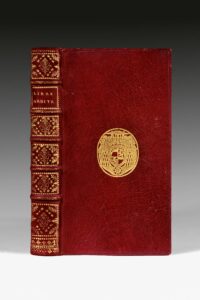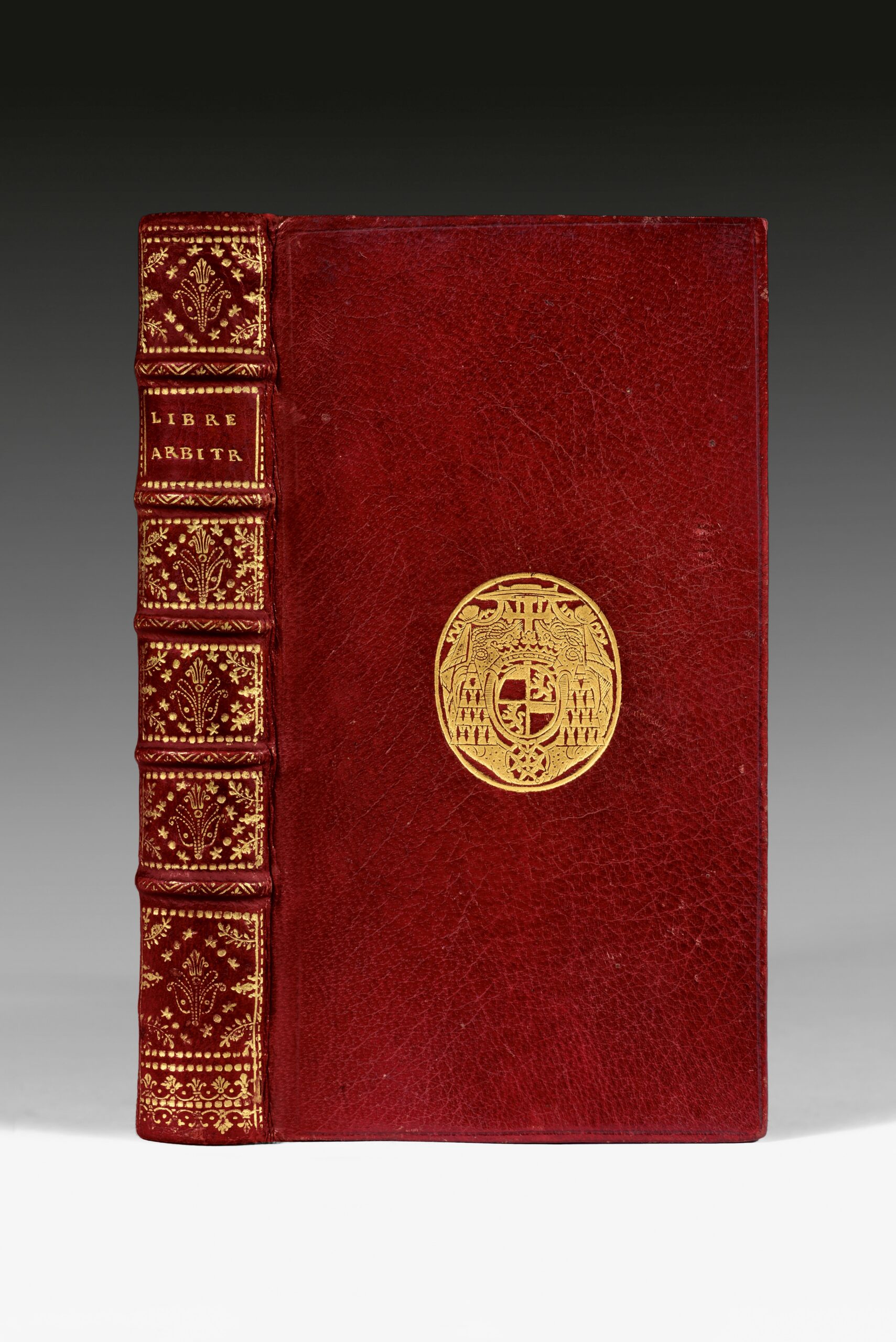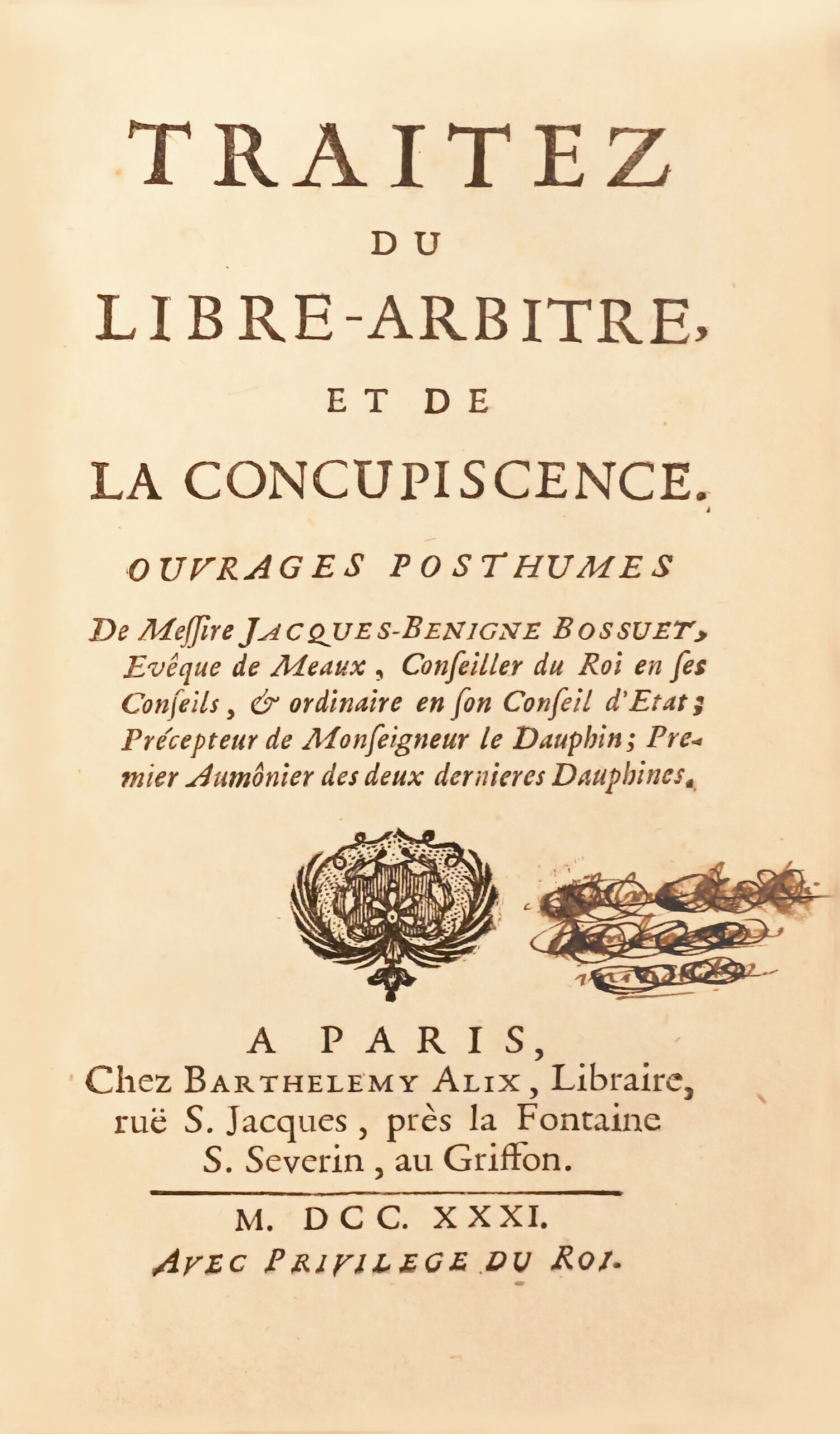Paris, Barthélémy Alix, 1731.
2 parts in 1 volume 12mo of 26 pp., (3) ll. of table, 155 pp., (1) bl. l., (1) l. of title, 218 pp., (6) ll. Bound in contemporary full red morocco, blind-stamped fillet around the covers, gilt-stamped arms in the center, richly decorated spine, gilt over marbled edges. Contemporary binding.
168 x 94 mm.
First edition of two major treatises by Bossuet.
Backer Library, no. 998; Morgand and Fatout Bulletin, no. 129; Rahir, La Bibliothèque de l’amateur, 336; Tchemerzine, I, 905.
Bossuet was appointed tutor to the dauphin in 1670 and the Traité du libre-arbitre is one of the works composed for the education of the future sovereign.
The subject addressed is ‘the means of reconciling our freedom with the certainty of god’s decrees’. The question of whether human choices exist independently of god’s sovereign grace had divided French Catholics into two camps: the Jesuits, supported by the high clergy and the king, and the Jansenists of Port-Royal, a minority but united around brilliant theological and intellectual authorities such as Arnault and Pascal. The years during which Bossuet was tutor to the Dauphin coincided almost exactly with the peace of the church of France (1668-1678). Moreover, the Jansenists were among the few people who did not come into conflict with Bossuet, even though his position at court did not allow him to display too openly his interest in the theology of Port-royal.
The richness of the treatise on free will lies mainly in its fragile but courageous synthesis (Bossuet is addressing the future king of France, after all) of two fiercely opposed doctrines. This little-known text gives a very accurate account of a period of official tolerance that was soon overcome by the restriction of religious freedoms.
The Traité de la concupiscence, written around 1693, reflects the following era, a troubled period in which doctrinal positions were much more rigid and morals much more liberal. Bishop of Meaux since 1681, listened to by the court, which traveled from Paris and Versailles to hear his sermons, and the undisputed doctor of the Church of France, Bossuet attacks libertines and socialites, railing against the falsehood of their minds and the vanity of their lives. This text was to be ‘Considérations sur les paroles de Saint Jean : ‘N’aimez pas le monde’, but Bossuet’s nephew, Bishop of Troyes and author of the preface to this edition, preferred the other, more severe title.
The link with Versailles remained until the end of Bossuet’s life. He occupied an essential place within the French court, serving as advisor to the King in his councils and as ordinary advisor in his councils of state.
A precious copy bound in contemporary red morocco, with the coat of arms of Charles-Gaspard-Guillaume de Vintimille du Luc (1655-1746).
He was Archbishop of Aix from 1708 and then Abbot of Saint-Denis in Reims in 1710. In 1724, he was appointed Knight of the Order of the Holy Spirit by Louis XV, and then became Archbishop of Paris and Peer of France in 1729.
“This prelate, who found himself involved in all the Jansenist controversies and who, due to his weak character, was unable to impose his ideas of moderation, died in Paris on March 13, 1746, at the age of 90, leaving behind a beautiful library with richly bound books.” (Olivier, pl. 1429).
“The collection of this distinguished bibliophile enjoyed a great reputation in his day for the beauty of its volumes and the elegance of its bindings” (Guigard, Armorial du Bibliophile, I, 379).
The original editions of Bossuet, preserved in armorial morocco from the period, have always been sought after by bibliophiles.


